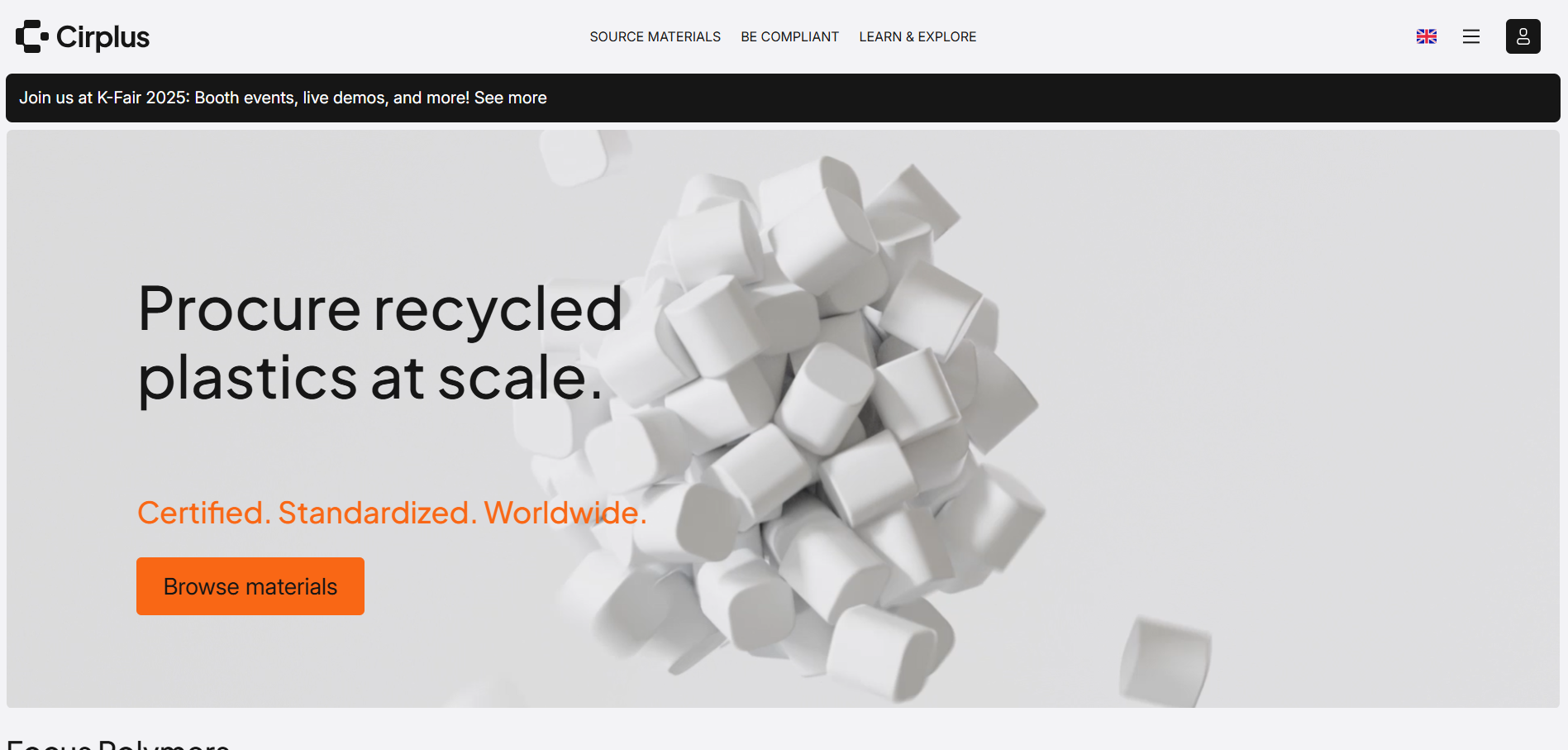Understanding the Global Marketplace for Recycled Plastics
Procure recycled plastics at scale – that is the vision driving this project. cirplus streamlines the procurement of qualified recycled plastics, saving customers over 25% by reducing costs and unlocking new markets. Powered by an award-winning end-to-end procurement platform, the project helps build stable supply chains, replace fossil carbon with recycled polymers, cut CO₂ emissions, and ensure compliance with evolving legislation. Mandatory quotas for recycled plastics are coming with no exceptions… This marketplace is built on the early promise of connecting industries that have long been fragmented, paving the way for a future where recycling isn’t just another process but a core asset in sustainable production.
Key Benefits and Cost Savings
- Saves over 25% by reducing costs and unlocking new markets
- Utilizes an award-winning, end-to-end procurement platform
- Offers materials that are EN 18065 certified, ensuring the highest quality and consistency
- Provides a Tiered Pricing Model with locked rates and volume-based discounts – the more committed, the less paid
- Delivers predictable costs for up to 12 months
Bridging the Recycling and Plastic Conversion Industries
cirplus is building the global marketplace for recycled plastics by connecting the two fragmented and intransparent industries of recycling and plastic conversion/manufacturing. The innovative end-to-end transaction software simplifies operations, creating a seamless flow from procurement to sales as a service. From unsorted waste to regrind, regranulates, and compounds, every link in the chain is addressed. This unified approach not only standardizes processes but also cuts through the intransparency that has long plagued these sectors… resulting in a system where transparency and efficiency work hand in hand.
Transforming the Low-Tech Recycling Landscape
The key reasons why plastic does not get recycled more frequently – and subsequently ends up in the oceans – are threefold. First, the price of recycled plastics versus virgin plastic is too high; second, not enough quality recycled material is available, signifying a clear supply shortage; and third, the overall industry of recycling and plastic conversion is extremely low-tech. To tackle these challenges head-on, cirplus is lowering the transaction cost for recycled plastics. This progressive move rides on the backheels of sweeping new European and national legislation mandating circular economy solutions… infusing much-needed technology and modern practices into an outdated process.
Standardizing Recyclates and Input Streams
The platform provides procurement and sales as a service for recycling and plastic processing industries. It standardizes recyclates and input streams, creating transparency regarding globally available quantities and qualities of recycled plastics. Through both spot and contract tenders, the system ensures that stakeholders have clear visibility into what is available in the market. In-stock recycled materials can be explored, or custom orders can be requested, meaning that every cog in the recycling machinery benefits from uniformity and precision. With materials being EN 18065 certified, market participants enjoy the highest quality and consistency available today… building trust and encouraging broader adoption of recycled materials.
Driving Sustainable Development Goals
- SDG 12: Responsible Consumption and Production
- SDG 13: Climate Action
- SDG 9: Industry, Innovation, and Infrastructure
- SDG 7: Affordable and Clean Energy – through reduced CO₂ emissions
Paving the Way for a Circular Plastic Economy
cirplus’s end-to-end platform plays a pivotal role in driving sustainable change. Not only does it help in building stable supply chains and unlocking new markets, but it also supports the transition from a linear to a circular plastic economy. By replacing fossil carbon with recycled polymers, the initiative cuts CO₂ emissions and aligns with stringent new legislation that demands circular economy solutions. Locked rates and volume-based discounts offered by the Tiered Pricing Model allow companies to plan ahead with predictable costs for up to 12 months, facilitating the scaling of operations sustainably… all of which contribute significantly to a greener future.
The dynamic approach of this platform brings together multiple facets of a complex industry. It leverages technology to address long-standing issues like the high cost of recycled plastics versus virgin plastic, as well as a persistent quality and supply shortage. The integration of advanced transaction software into an industry that has traditionally been low-tech is a turning point. Such digital transformation makes the procurement process more transparent and efficient, leading to increased trust among the diverse players involved. These cumulative improvements are not just operational upgrades – they set the stage for systemic change in the global plastics market.
By standardizing the recyclates and input streams, the narrative shifts from a story of waste management to one of resource optimization. The project proves that innovation layered upon recognized quality standards, such as the EN 18065 certification, can transform recycled plastic procurement into a reliable and predictable process. Custom orders, alongside available stock, ensure that customer needs are met with precision and flexibility. This approach is refreshing… and represents a significant departure from previous practices that often left stakeholders grappling with inconsistencies and opaque market conditions.
Ultimately, this initiative underscores the importance of marrying modern technology with sustainability goals. With sweeping new legislation on the horizon and increasing global demand for recycled materials, the project stands as a beacon for sustainable practices in the plastics industry. It is a robust model that not only addresses immediate logistical challenges but also contributes to long-term ecological benefits. The blend of cost savings, quality assurance, and environmental impact forms a solid foundation for future growth in the circular plastics economy.





















